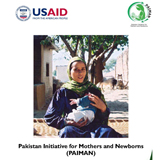
The Pakistan Initiative for Mothers and Newborns (PAIMAN) was designed to assist the Government of Pakistan (GOP) implement the full spectrum of interventions necessary to address maternal and newborn health issues in Pakistan. The initiative, funded by USAID, was planned as a five-year project. It was launched in October 2004 and was to be completed in September 2009. PAIMAN’s initial mandate was to assist the GOP to improve the status of maternal and newborn health in ten districts. In 2007, the geographic scope of the project was expanded to include two Agencies and two Frontier Regions of the Federally Administered Tribal Areas (FATA), and District Swat. In September 2008, USAID awarded the consortium an expansion of the project, adding 13 more districts and increasing the scope of work to include child health and child spacing as well as an additional project year, bringing the project end date to September 2010. As a result, PAIMAN evolved into an integrated maternal, newborn, child health, and family planning project two years prior to its expected closing.
The project budget was $92 million and it served a population of 34 million with a per capita expenditure of $2.70 for the six year project life.
The PAIMAN project was led by JSI Research & Training Institute, Inc. (JSI), a U.S.-based public health organization with extensive experience in leading similar projects in many countries. The team included a diverse set of partners: Aga Khan University (AKU), Contech International, Greenstar Social Marketing (GS), Johns Hopkins University Bloomberg School of Public Health Center for Communication Programs (JHU/CCP), the Pakistan Voluntary Health Nutrition Association (PAVHNA), Population Council, and Save the Children US (SC/US). The National Commission for Maternal and Neonatal Health (NCMNH), and Mercy Corps contributed in specific areas. The members of this partnership and the collaborating organizations had extensive experience in implementing maternal and newborn care and health projects in Pakistan and other countries.
The USAID-funded PAIMAN Project saved more than 30,000 newborn babies by reducing neonatal mortality by 23 percent through a replicable model of interventions. >> Read the press release